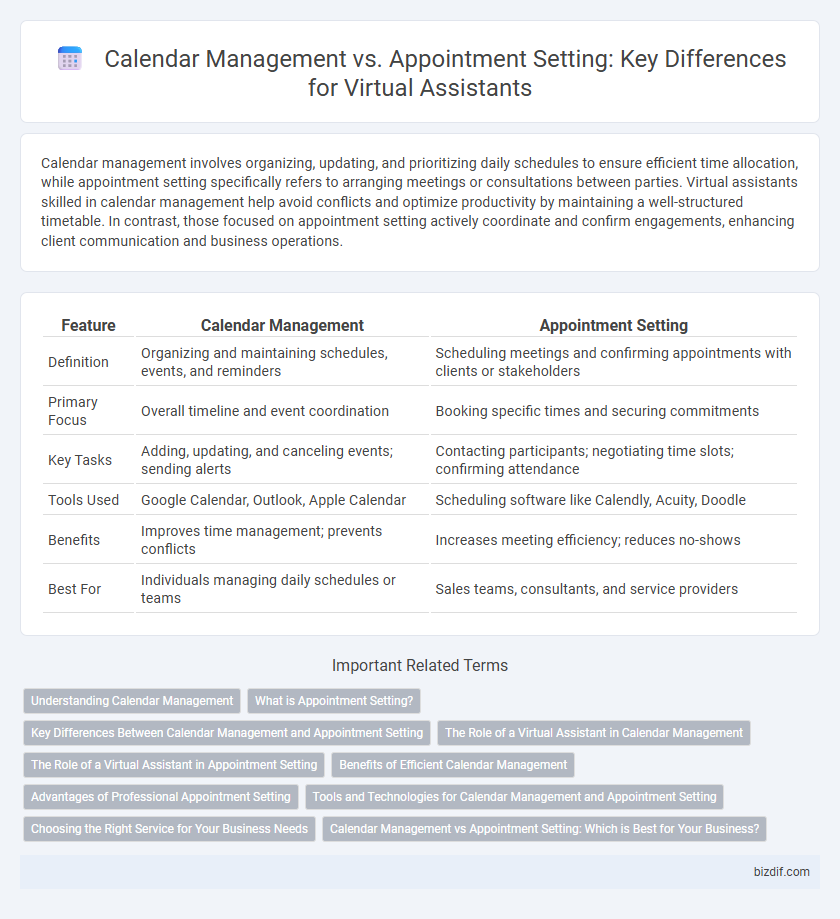Calendar management involves organizing, updating, and prioritizing daily schedules to ensure efficient time allocation, while appointment setting specifically refers to arranging meetings or consultations between parties. Virtual assistants skilled in calendar management help avoid conflicts and optimize productivity by maintaining a well-structured timetable. In contrast, those focused on appointment setting actively coordinate and confirm engagements, enhancing client communication and business operations.
Table of Comparison
| Feature | Calendar Management | Appointment Setting |
|---|---|---|
| Definition | Organizing and maintaining schedules, events, and reminders | Scheduling meetings and confirming appointments with clients or stakeholders |
| Primary Focus | Overall timeline and event coordination | Booking specific times and securing commitments |
| Key Tasks | Adding, updating, and canceling events; sending alerts | Contacting participants; negotiating time slots; confirming attendance |
| Tools Used | Google Calendar, Outlook, Apple Calendar | Scheduling software like Calendly, Acuity, Doodle |
| Benefits | Improves time management; prevents conflicts | Increases meeting efficiency; reduces no-shows |
| Best For | Individuals managing daily schedules or teams | Sales teams, consultants, and service providers |
Understanding Calendar Management
Calendar management involves organizing, scheduling, and prioritizing events to maximize productivity and avoid conflicts, while appointment setting specifically targets arranging meetings or calls with clients or colleagues. Effective calendar management ensures seamless integration of personal and professional commitments, enabling timely reminders and adjustments. Mastering calendar management enhances overall time efficiency and reduces missed opportunities.
What is Appointment Setting?
Appointment setting involves coordinating and scheduling specific meetings or consultations between clients and service providers, ensuring optimized time slots and confirmed attendance. It requires proactive outreach, communication skills, and managing client expectations to reduce no-shows and maximize productivity. Unlike calendar management, appointment setting emphasizes direct interaction and negotiation to secure committed appointments.
Key Differences Between Calendar Management and Appointment Setting
Calendar management involves organizing, maintaining, and optimizing an individual's or business's schedule by tracking events, deadlines, and appointments across multiple platforms. Appointment setting specifically focuses on securing meetings or calls between parties, ensuring date and time coordination to enhance productivity. The key difference lies in calendar management offering a broader scheduling overview, while appointment setting targets creating new, confirmed meeting opportunities.
The Role of a Virtual Assistant in Calendar Management
A virtual assistant in calendar management ensures seamless organization by scheduling, updating, and prioritizing appointments to maximize productivity. They synchronize calendars across devices and platforms, reducing scheduling conflicts and enhancing time efficiency. By proactively managing reminders and deadlines, virtual assistants help maintain a structured and optimized daily agenda for clients.
The Role of a Virtual Assistant in Appointment Setting
A virtual assistant specializes in appointment setting by handling client communications, confirming availability, and scheduling meetings efficiently, ensuring no conflicts or double bookings occur. Their expertise in calendar management allows them to organize appointments with precision, sync multiple calendars, and send timely reminders to reduce no-shows. Utilizing tools like Google Calendar, Calendly, and Microsoft Outlook, virtual assistants streamline the entire appointment-setting process to enhance productivity and client satisfaction.
Benefits of Efficient Calendar Management
Efficient calendar management streamlines scheduling by consolidating all commitments in one accessible platform, reducing the risk of double bookings and missed appointments. It enhances productivity through seamless coordination of meetings, deadlines, and personal events, maximizing time utilization. Virtual assistants equipped with advanced calendar management tools help optimize daily workflows, ensuring timely notifications and easy adjustments to dynamic schedules.
Advantages of Professional Appointment Setting
Professional appointment setting streamlines client scheduling by efficiently managing time slots and reducing no-shows through confirmation protocols. It enhances customer experience with personalized communication and timely reminders, leading to higher conversion rates and improved client retention. Unlike general calendar management, appointment setting focuses on proactive client engagement and optimized resource allocation, driving business growth.
Tools and Technologies for Calendar Management and Appointment Setting
Calendar management integrates tools like Google Calendar, Microsoft Outlook, and Apple Calendar, offering seamless scheduling, reminders, and synchronization across devices. Appointment setting utilizes specialized platforms such as Calendly, Acuity Scheduling, and Doodle to automate booking, send confirmations, and manage availability with real-time updates. Both systems leverage AI-powered assistants and CRM integrations to enhance productivity and reduce scheduling conflicts.
Choosing the Right Service for Your Business Needs
Calendar management streamlines your schedule by organizing events, deadlines, and reminders to maximize productivity and prevent conflicts. Appointment setting focuses on securing meetings with clients or stakeholders, increasing business opportunities and client engagement. Selecting the right service depends on your priorities--opt for calendar management to maintain overall organization, or appointment setting to drive targeted interactions and sales growth.
Calendar Management vs Appointment Setting: Which is Best for Your Business?
Calendar management involves organizing and maintaining your entire schedule, ensuring seamless coordination of meetings, deadlines, and events, while appointment setting focuses solely on scheduling specific client or customer meetings. Effective calendar management maximizes productivity by providing a comprehensive view of business commitments, reducing conflicts, and optimizing time allocation. For businesses seeking streamlined operations and improved time efficiency, prioritizing calendar management often delivers more strategic benefits compared to just appointment setting.
Calendar management vs Appointment setting Infographic

 bizdif.com
bizdif.com